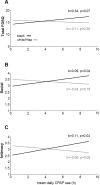Does race-ethnicity moderate the relationship between CPAP adherence and functional outcomes of sleep in US veterans with obstructive sleep apnea syndrome?
- PMID: 25317089
- PMCID: PMC4173086
- DOI: 10.5664/jcsm.4106
Does race-ethnicity moderate the relationship between CPAP adherence and functional outcomes of sleep in US veterans with obstructive sleep apnea syndrome?
Abstract
Background: Little is known about the association of race-ethnicity and the relationship of continuous positive airway pressure (CPAP) adherence with functional outcomes of sleep in American samples with obstructive sleep apnea syndrome (OSAS). This retrospective study examines whether race-ethnicity moderates the relationship between CPAP adherence and functional outcomes of sleep in OSAS.
Methods: Over 4 months, consecutive OSAS patients had CPAP data downloads and completed questionnaires (demographics, Functional Outcomes of Sleep Questionnaire [FOSQ], Epworth Sleepiness Scale [ESS], Insomnia Severity Index [ISI]) at the Miami VA sleep center. Medical diagnoses and polysomnography data were obtained from medical record. CPAP adherence was measured as mean daily hours of use. Hierarchical regression modeling was used to explore the differential impact of race-ethnicity and CPAP adherence on functional outcomes of sleep.
Results: Two hundred twenty-seven veterans (93% male, age 59 ± 11 years) were included; 142 (63%) participants self-reported as white or Hispanic, and 85 participants (37%) as black. Hierarchical regression analyses failed to show main effects for race-ethnicity or CPAP use and FOSQ scores; however, the interaction of race-ethnicity with CPAP adherence was significantly associated with the total FOSQ (p = 0.04), Social (p = 0.02), and Intimacy (p = 0.01) subscale scores. For blacks, in adjusted analyses, CPAP adherence was positively associated with Social and Intimacy FOSQ subscales; however, no significant relationship was noted between CPAP use and FOSQ scores in whites/Hispanics.
Conclusions: Race-ethnicity may moderate the relationship between CPAP adherence and some functional outcomes of sleep; however, further studies are needed.
Keywords: adherence; functional outcomes; positive airway pressure; quality of life; race-ethnicity; sleep apnea; veterans.
Figures

References
-
- Weaver TE. Outcome measurement in sleep medicine practice and research. Part 1: Assessment of symptoms, subjective and objective daytime sleepiness, health-related quality of life and functional status. Sleep Med Rev. 2001;5:103–28. - PubMed
-
- Finn L, Young T, Palta M, Fryback DG. Sleep-disordered breathing and self-reported general health status in the Wisconsin Sleep Cohort Study. Sleep. 1998;21:701–6. - PubMed
MeSH terms
LinkOut - more resources
Full Text Sources
Other Literature Sources

